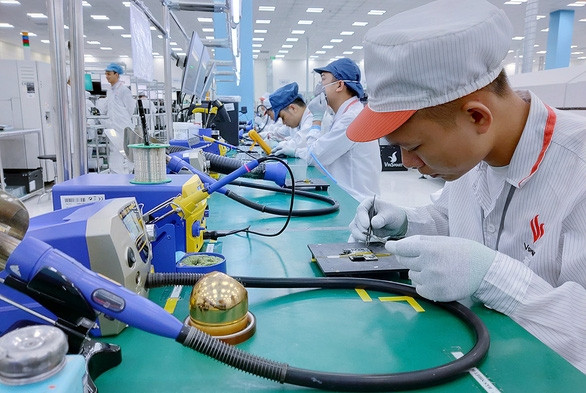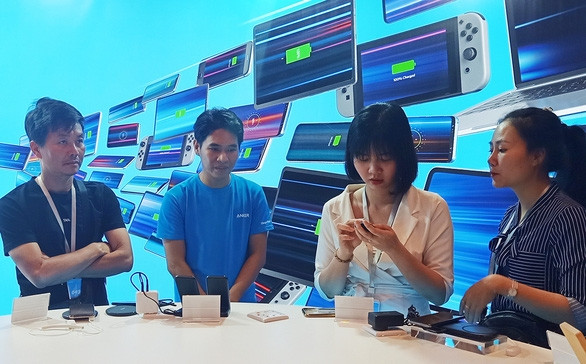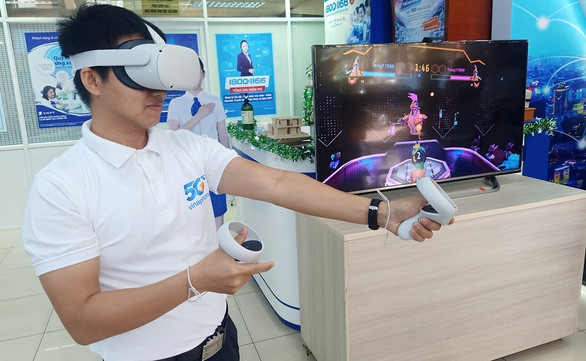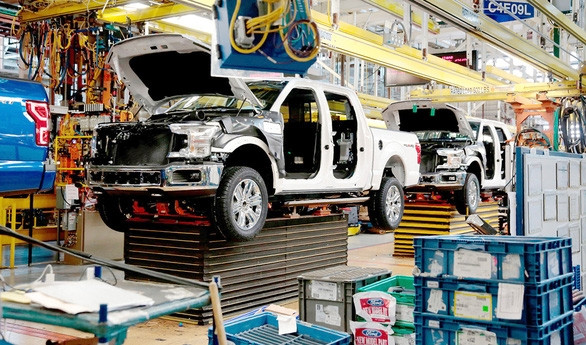The global chip (microprocessor) crisis has begun to have an impact on domestic electronics and technology manufacturing businesses.

Many technology and consumer electronics manufacturing sectors in Vietnam are worried about chip shortages, such as the smartphone manufacturing industry.
In a post shared on his personal Facebook page on April 22, Mr. Nguyen Tu Quang - CEO of Bkav Company - said that technology product manufacturing companies are having to "try to search all over the world" for chip supplies, even having to compete to buy and stockpile as much as possible.
More than 90% of businesses affected?
Since mid-2020, Bkav Electronics has begun to see signs of a shortage of LCD screen components as costs continue to rise. "In September 2020, chip suppliers sent us reports about increasing the standard lead time for processing chips, memory chips, and power management chips," Mr. Tran Viet Hai, general director of Bkav Electronics, told Tuoi Tre.
The cause of the incident is believed to be due to chip foundries being overloaded with orders. "There is no longer any supply of chips with a process of 45nm or higher, and prices have increased 5-7 times. Chip foundries maximize profits by focusing on producing high-value-added chips with a process of less than 10nm.
By the end of 2020, chip manufacturers and component suppliers reported this shortage, warning that standard delivery times would be up to 10 months," Mr. Hai informed.
Mr. Ly Quoc Chinh, Technology Director and Production Director of VNPT Technology Company, also said that this enterprise is producing a number of terminal broadcasting equipment, television service equipment, camera monitoring equipment... and ODM (Original Design Manufacturing) production activities.
With an annual output of about 3 million products, the demand for chips will increase sharply. However, delivery times tend to be longer and chip supply is starting to become scarce, and prices are rising.
According to Mr. Chinh, in the transition period between 4G and 5G technology, the 4th industrial revolution and the need for digital transformation are taking place strongly, so the demand for production as well as the demand for chips in the coming time will tend to increase according to the speed of the market's technological development needs.
And not only chipsets (also known as chips) but the demand for electronic device components also tends to increase compared to previous years...
Many enterprises producing electronic and technological devices in Vietnam have admitted that they have begun to be affected by the global chip crisis, albeit at different levels. Because chips appear in most electronic devices, even the simplest ones such as the new citizen identification card ofVietnameseMale, to popular household electronic devices such as televisions, refrigerators, induction cookers, electronic rice cookers...
Meanwhile, Vietnam has almost no enterprise that can fully produce a chip (from research, design, production), so it has to depend on foreign countries, mainly China.
"Therefore, it can be said that more than 90%, even 99% of domestic electronic and technology equipment manufacturing enterprises are affected by the global chip crisis" - an expert in the microchip field atVietnameseMalecomment.

The global shortage of electronic chips also affects Vietnamese technology businesses.
Go collect chips
To overcome this situation, many Vietnamese enterprises specializing in manufacturing electronic and technological products have to take advantage of the opportunity to find chip sources from "partners who have changed their business plans" and have surplus batches of unused components.
"This buying and selling is going very busy and there is a phenomenon of competition for purchase," said the director of a company, admitting that the company's international purchasing team was extremely happy to have just collected a batch of 8,000 components for the AI View camera.
"In the long term, we have come up with response plans, such as diversifying component supply sources, converting designs to components that are safe in terms of supply, and negotiating strategies with manufacturers to jointly resolve the issue," said Mr. Tran Viet Hai (General Director of Bkav Electronics).
According to businesses, the competition among manufacturing companies to buy and hoard chips "will continue to happen every day and for a long time, with all technology product manufacturers around the world". Mr. Tran Viet Hai said that Bkav usually imports a buffer of components for 20-28 weeks, so in the short term, it has not been greatly affected.
"In the long term, we have come up with response plans, such as diversifying component supply sources, converting designs to components with safe supply sources, and negotiating strategies with manufacturers to resolve the issue together," said Mr. Hai.

Electronic chips appear in most electronic devices and modern technology, so many Vietnamese technology companies are also "hunting" for supplies.
Similarly, Mr. Ly Quoc Chinh also said that the enterprise is promoting many countermeasures to ensure the source of raw materials for production, such as strengthening information access activities, market forecasting, and a longer-term vision of the market; seeking more suppliers to increase competitiveness; seeking alternative raw materials; expanding the supplier network... At the same time, being proactive in research and development activities, orienting the use of more common components, and limiting exclusive components.
In particular, some enterprises with resources are looking for ways to increase their level of "autonomy", reducing as much as possible the level of dependence on foreign countries... because the chip and component crisis may last and will certainly repeat itself in the future.
For example, VNPT Technology is promoting the ability to "master the design and manufacturing of products so that it can proactively change different components and materials while still ensuring product quality".
Dien Quang Company - providing products, services, lighting solutions, electrical equipment and smart control - invests in synchronous production lines that meet international standards, from LED chip production lines, electronic circuit boards, plastic injection components to finished products, not to mention automatic LED chip production lines with an output of up to 150 million chips per year.
"Dien Quang is the first unit in Vietnam to produce SMD LED chips with capacities of 0.2w, 0.5w, 1w, enough to meet the production of LED lights for the domestic and export markets" - said a representative of this company.
Demand increases, supply is scarce Many Vietnamese technology companies said they are planning to expand production, some even plan to increase total production output 3-4 times compared to 2020, so there will be a great demand for chips and electronic components in the near future. Meanwhile, according to experts, the COVID-19 pandemic and trade war have made raw materials for components more scarce. In particular, the prolonged pandemic situation globally has also led to many restrictions on trade and transportation, port congestion, and container shortages, leading to extended delivery times, not to mention the situation of more speculation and hoarding of raw materials, pushing up chip prices. |
How is the global chip shortage?

Ford Motor Company's vehicle assembly line in Dearborn, Michigan, USA. Ford is one of the automakers most affected by the chip shortage.
Consumers are facing rising prices and shortages of products ranging from televisions and mobile phones to cars and games consoles as a global chip shortage worsens, The Guardian reports.
In mid-April, Taiwan Semiconductor Manufacturing Company (TSMC), the world's largest contract chipmaker, warned that the chip shortage could last until 2022.
According to Nikkei Asia magazine, the US is urging the world's chipmakers to bring advanced chip production to the US in the hope of seizing the leading position in semiconductor production, which is currently concentrated in Taiwan, South Korea and mainland China.
The New York Times this week described the impact of the chip shortage on the auto industry: "Around the world, many car assembly lines are going quiet, workers are out of work, and dealership parking lots are empty."
Mercedes-Benz has begun stockpiling chips for its more expensive models and is temporarily shutting down plants that produce its lower-priced C-Class. Porsche warned U.S. dealers this month that customers could have to wait up to 12 weeks for their cars because of a shortage of chips used to monitor tire pressure.
Why the chip shortage? According to Reuters, the shortage stems from a combination of factors as automakers compete with the consumer electronics industry for chip supplies.
Consumers are buying more laptops, game consoles and other electronics amid the COVID-19 pandemic.
US sanctions on Chinese tech companies have exacerbated the crisis. Initially focused on the auto industry, the chip shortage has now spread to a range of consumer electronics, including smartphones, refrigerators and microwaves.
Nvidia provides chip technology for VinFast electric vehicles VinFast has just announced its choice of chip technology from Nvidia (USA) - the world's leading manufacturer of graphics processors - for use on electric vehicles launched in 2022. Specifically, VinFast will use the technology platform of Nvidia Drive Xavier chips and plans to upgrade to the new generation Nvidia Drive Orin chips for high-end car versions later. Nvidia's chip technology supports special car features such as route planning, locating charging stations and dealers, warning of theft risks, learning and remembering user habits, self-driving on highways, automatic parking... The application will help VinFast electric vehicles have a faster information processing system, thereby increasing safety and enhancing the vehicle's self-driving capabilities. Ms. Thai Thi Thanh Hai, Vice President of Vingroup and General Director of VinFast, shared: "By choosing Nvidia's technology, VinFast electric vehicles will be equipped with self-driving features, applying artificial intelligence technology and the most advanced wireless connections." |
According to Tuoi Tre